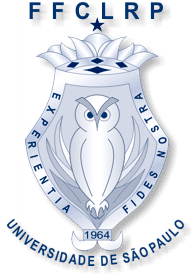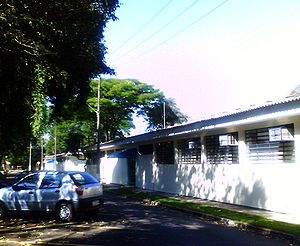
Faculdade de Filosofia, Ciências e Letras de Ribeirão Preto
Encyclopedia


Liberal arts
The term liberal arts refers to those subjects which in classical antiquity were considered essential for a free citizen to study. Grammar, Rhetoric and Logic were the core liberal arts. In medieval times these subjects were extended to include mathematics, geometry, music and astronomy...
college (according to the French university
University
A university is an institution of higher education and research, which grants academic degrees in a variety of subjects. A university is an organisation that provides both undergraduate education and postgraduate education...
tradition, in Brazil they nominate philosophy, sciences and letters as their undergraduate subjects, although some of these courses are not offered) of the University of São Paulo
University of São Paulo
Universidade de São Paulo is a public university in the Brazilian state of São Paulo. It is the largest Brazilian university and one of the country's most prestigious...
campus at Ribeirão Preto
Ribeirão Preto
Ribeirão Preto is a municipality and city in the Northeastern region of the state of São Paulo in Brazil. It is nicknamed Brazilian California, because of a combination of an economy based on agrobusiness plus high technology, wealth and sunny weather all year long. With 605,114 inhabitants,...
, state of São Paulo
São Paulo
São Paulo is the largest city in Brazil, the largest city in the southern hemisphere and South America, and the world's seventh largest city by population. The metropolis is anchor to the São Paulo metropolitan area, ranked as the second-most populous metropolitan area in the Americas and among...
, Brazil
Brazil
Brazil , officially the Federative Republic of Brazil , is the largest country in South America. It is the world's fifth largest country, both by geographical area and by population with over 192 million people...
.
The school was created by a decree of the state government of São Paulo in October 1959. However, it began to function effectively with its first courses in 1966, only. In the beginning the school was helped by the Faculdade de Medicina de Ribeirão Preto
Faculdade de Medicina de Ribeirão Preto
Faculdade de Medicina de Ribeirão Preto is a medical school of the University of São Paulo located in the city of Ribeirão Preto, state of São Paulo, Brazil, founded 1952...
(Medical School of the University of São Paulo). Its first director was a medical professor, Dr. Lucien Lison
Lucien Lison
Lucien Alphonse Joseph Lison was a Belgian/Brazilian physician and biomedical scientist, considered the "father of histochemistry" ....
and several of the classrooms were shared with the medical school at its campus. Later, the FFCLRP built its own premises in the same campus. Presently it occupies an area of 21.208 m².
The school's motto is Experientia Fides Nostra (Experience is Our Faith) and the owl
Owl
Owls are a group of birds that belong to the order Strigiformes, constituting 200 bird of prey species. Most are solitary and nocturnal, with some exceptions . Owls hunt mostly small mammals, insects, and other birds, although a few species specialize in hunting fish...
in the crest of arms refers to the symbol of Athena
Athena
In Greek mythology, Athena, Athenê, or Athene , also referred to as Pallas Athena/Athene , is the goddess of wisdom, courage, inspiration, civilization, warfare, strength, strategy, the arts, crafts, justice, and skill. Minerva, Athena's Roman incarnation, embodies similar attributes. Athena is...
, the Greek goddess of wisdom and knowledge.
Presently FFCLRP-USP has four academic departments:
- Biology
- Physics & Mathematics
- Psychology & Education
- Chemistry
The following baccalaureate
Bachelor's degree
A bachelor's degree is usually an academic degree awarded for an undergraduate course or major that generally lasts for three or four years, but can range anywhere from two to six years depending on the region of the world...
courses are offered:
- BiologyBiologyBiology is a natural science concerned with the study of life and living organisms, including their structure, function, growth, origin, evolution, distribution, and taxonomy. Biology is a vast subject containing many subdivisions, topics, and disciplines...
- PsychologyPsychologyPsychology is the study of the mind and behavior. Its immediate goal is to understand individuals and groups by both establishing general principles and researching specific cases. For many, the ultimate goal of psychology is to benefit society...
- ChemistryChemistryChemistry is the science of matter, especially its chemical reactions, but also its composition, structure and properties. Chemistry is concerned with atoms and their interactions with other atoms, and particularly with the properties of chemical bonds....
- Technical Chemistry
- Information SciencesInformation science-Introduction:Information science is an interdisciplinary science primarily concerned with the analysis, collection, classification, manipulation, storage, retrieval and dissemination of information...
- Medical PhysicsMedical physicsMedical physics is the application of physics to medicine. It generally concerns physics as applied to medical imaging and radiotherapy, although a medical physicist may also work in many other areas of healthcare...
- Biomedical Informatics
- MathematicsMathematicsMathematics is the study of quantity, space, structure, and change. Mathematicians seek out patterns and formulate new conjectures. Mathematicians resolve the truth or falsity of conjectures by mathematical proofs, which are arguments sufficient to convince other mathematicians of their validity...
applied to BusinessBusinessA business is an organization engaged in the trade of goods, services, or both to consumers. Businesses are predominant in capitalist economies, where most of them are privately owned and administered to earn profit to increase the wealth of their owners. Businesses may also be not-for-profit...
FFCLRP has also an extensive post-graduate school, with courses in the following areas:
- Comparative biologyComparative biologyComparative biology is a multidisciplinary approach to understanding organismic diversity that uses natural variation and disparity to elucidate phylogenetic history. Comparative biologists attempt to understand the diversity and complexity of life at all levels—from genes, to anatomy, to...
- EntomologyEntomologyEntomology is the scientific study of insects, a branch of arthropodology...
- Physics applied to Biology and Medicine
- Psychobiology
- Psychology
- Chemistry
Presently (December 2004), 1313 undergraduate students are enrolled. More than 5,800 students already graduated since its inauguration. There are also 496 graduate students (213 in Masters and 283 in Doctoral programs). There are 148 professors, the majority with tenure and full time.
There are several research laboratories and community extension centers affiliated to FFCLP:
- Centro Brasileiro de Investigações sobre o Desenvolvimento e Educação Infantil (CINDEDI);
- Centro de Ensino Integrado de Química (CEIQ);
- Centro de Instrumentação, Dosimetria e Radioproteção (CIDRA);
- Centro de Psicologia Aplicada (CPA)
- L@ife - Laboratório Interdisciplinar de Formação do Educador;
- Rede SACI - COM.VIVER - Centro de Informação e Convivência.

